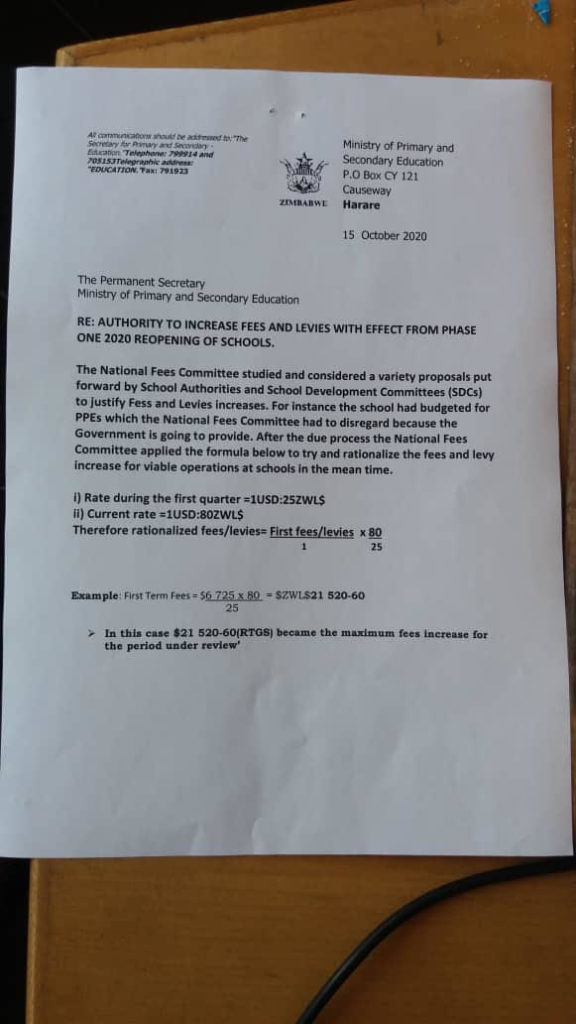The Ministry of Primary and Secondary Education says parents have the right to challenge any fees hike amid reports that the government has set new guidelines on how fees and levies should be adjusted following the reopening of schools.
This comes after parents expressed concern that schools were pegging fees and levies to the prevailing exchange rate, a development that would see many struggling to pay fees.
Grade Six, Form Three and Form Five classes returned to school on Monday after closing prematurely towards the end of the First Term in March as part of measures to curb the spread of Covid-19.
A memorandum from the education ministry dated October 15, 2020, to schools, read that the National Fees Committee had studied and considered a variety of proposals put forward by school authorities and School Development Committees (SDCs) to justify fees and levies increases.
After the process, the National Fees Committee came up with a formula that includes incorporating the US exchange rate during the first quarter where it was US$1: ZWL$25 and the current rate which is US$1: ZWL$80.
“…the formula is to try and rationalise the fees and levy increase for viable operations at schools in the meantime,” read the memorandum.
The formula reads like this: First fees/levies multiplied by the current rate, which is 80 and divided by old rate that was 25.

According to the memo above, the maximum fees that schools can charge parents should not be more than ZWL$21 520. 60.
The maximum fee that could be charged as seen in the memo for January was ZWL$ 6 725.
In an interview with CITE, deputy minister of the Primary and Secondary Education Ministry, Edgar Moyo explained that it was not the government that raised fees but recommendations came from schools.
“It’s not the government’s responsibility to raise fees but the ministry’s role is to give advice and recommendations. If parents feel, there’s a need to increase fees there are procedures to be followed. A school calls a meeting where a minimum of 20 percent of the parents must attend to discuss the budget and agree to a new figure,” he said.
“The parents must append their signatures on the attendance register, which must be confirmed by the headmaster, co-signed by the SDC chairperson and vice-chairperson.”
Moyo said after that meeting, the school then applied to the education ministry to raise the fees in line with parents’ recommendations.
“The application goes through to the ministry then to the permanent secretary, who may decline or accede to the request. Some schools may see no need to increase fees, say the school has a farm and produces its food.
“Then there are elitist schools such as Falcon where parents say their children are used to eating bacon, eggs and sausages so they don’t want them to drop that standard when they go to school. Then there are some schools like Dombodema, which will say its children eat porridge in the morning,” he noted.
However, the deputy minister said it was a wrong approach to calculate the cost of fees using the rate of the US.
“Not everything is charged in the US. Using the US itself in a wholesome manner is statistically wrong,” Moyo said.
He urged parents and the SDC to make sure fees are affordable and if that was not the case, the affected must raise this with the education who would send a team to investigate.
“This is the parents’ right, as the fees must be accompanied by a letter of approval. Parents can raise complaints and say they don’t know how the fees hike was affected. They can refuse to pay it and tell the ministry,” said the deputy minister.
Moyo said parents must sit down and agree to a fee change, using whatever method.
“A headmaster must not shove the US rate but calculate the cost of fees. For example, a boarding school can say one child eats 200 grammes of meat every seven days, adding the cost of electricity and workers who work there. The fees cost has to be calculated on real costs, not on imagined cost,” he said.
“Then we also have many categories of schools. We have private, council and government schools who have different requirements.”

